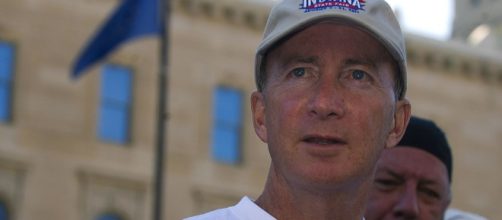Mitch Daniels has been the system president for Purdue University for nearly a decade. He has been preparing to leave the position behind after announcing his impending departure.
It's not necessarily certain that Daniels is planning on settling into retirement following his Purdue tenure. Daniels had previously had a lengthy career in politics, serving in various roles. And it seems that some are hoping he'll make a return to form.
Could make another gubernatorial run
Mitch Daniels is reportedly considering launching a campaign for another term as governor of Indiana.
If he were to run and be successful, it would be his third term as the state's chief executive.
A Republican, Daniels is apparently intrigued by the possibility. The next Indiana gubernatorial election is scheduled for 2024. Current Governor Eric Holcomb, also a Republican, is term-limited from running for another consecutive term. There does seem to be a base of eager supporters for another Daniels run. The Indianapolis Star reports that former staffers of his have created a PAC dedicated to encouraging him to run.
Daniels was first elected governor in 2004 over Democratic incumbent Joe Kernan. He would be re-elected in a landslide in 2008 over Democratic former U.S. Representative Jill Long Thompson.
Much like Holcomb, Daniels was ineligible to run for another term in the next election. Former U.S. Representative and fellow Republican Mike Pence was elected to succeed him. Pence, of course, would later become the vice president of the United States.
During his second term, it was widely expected that Daniels would himself run for president of the United States. The thought was that he would seek the 2012 Republican Presidential nomination. To the surprise of many, Daniels did not end up running.
But if Daniels makes a political comeback, it might not be to run for governor. According to Indianapolis Monthly, he might instead run for mayor of Indianapolis. Daniels is officially a resident of nearby Carmel.
To be eligible to run for the Indianapolis mayorship, he'd need to reside there for at least one year.
Daniels previously worked in the mayor's office
Mitch Daniels began his political career in earnest as a campaign staffer for William Ruckelshaus. In 1968, Ruckelshaus, then a state representative, ran for the U.S. Senate, losing to Democratic incumbent Birch Bayh. Shortly thereafter, Ruckelshaus joined the administration of President Richard Nixon. He'd become director of the Federal Bureau of Investigation, deputy attorney general and administrator of the Environmental Protection Agency. Ruckelshaus also served as EPA administrator during the Presidency of Ronald Reagan.
For his part, Daniels later joined the staff for then-Indianapolis Mayor Richard Lugar.
After being elected to the United States Senate, Lugard named Daniels as his chief of staff. Afterward, Daniels served as executive director of the National Republican Senatorial Committee and in the Reagan administration.
After his time with the White House, Daniels became president of the political think tank Hudson Institute. In 1988, Indiana Governor Robert D. Orr wanted to appoint Daniels to the U.S. Senate. A seat was being vacated by Dan Quayle, who was preparing to take over as U.S. vice president. Daniels turned the appointment down and U.S. Representative Dan Coats was eventually named to the Senate seat.
Later on, he was named an executive with the pharmaceutical manufacturer Eli Lilly and Company.
In 2001, President George W. Bush appointed Daniels as director of the Office of Management and Budget.
Initially grew up in Pennsylvania
A grandson of Syrian immigrants, Mitch Daniels is a native of Monongahela, Pennsylvania; near Pittsburgh. His family eventually moved to Indiana. He would graduate from North Central High School in Indianapolis.
Daniels received a bachelor's degree from Princeton University. There, he was a member of a debating society alongside future United States Supreme Court Justice Samuel Alito. Daniels would enroll at the Indiana University Robert H. McKinney School of Law. But would later transfer to the Georgetown University Law Center, where he would graduate.


